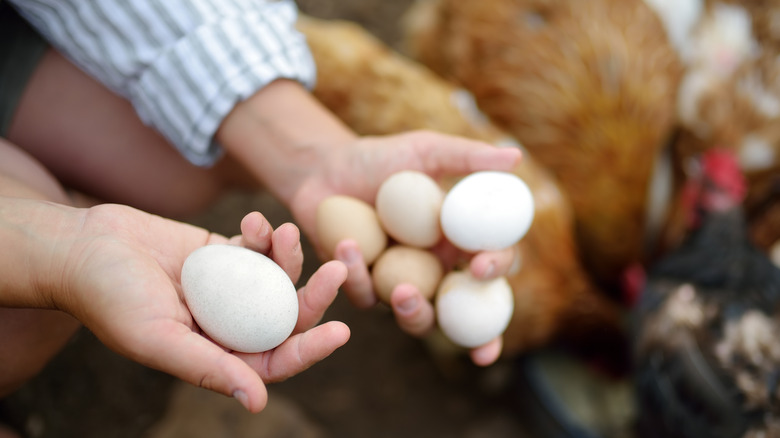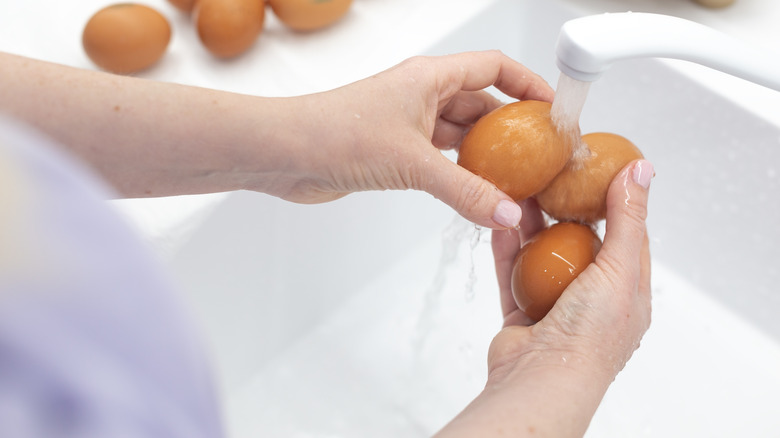Why You May Want To Wash Farm Fresh Eggs
Eggs are a necessity in many kitchens. Whether you're making perfect sunny side up eggs, hard-boiling a batch of them for an easy snack, or whisking them into your baking, eggs are a versatile household staple. While it's easy enough to pick up a carton at any grocery store, farm fresh eggs generally taste better and have positive health benefits. Whether you purchase them at a local farmers' market, have a neighbor or a friend who shares their egg supply with you, or raise backyard chickens yourself, farm fresh eggs are a major culinary coup for the home chef.
While you may find eggs in the store labeled "cage-free" or "free-range," chickens who lay farm fresh eggs are guaranteed to be living natural, healthy chicken lives — that is, simply roaming around and eating bugs and leafy vegetation, as opposed to a processed chicken feed that is often given to the hens at larger commercial farms. This simple difference in the chickens' diet leads to eggs that are lower in saturated fat and cholesterol, but higher in nutrients like Omega-3 fatty acids, Vitamin E, and beta carotene.
However, if you purchase farm fresh eggs, it's important to wash them before cooking them. While you may be used to just grabbing an egg out of a carton and cracking it right into a bowl, taking the time to wash your farm fresh eggs can prevent you from getting sick. Eggs at the grocery store have already undergone an extensive cleaning process to make them USDA-graded. Farm fresh eggs may still have dirt, feathers, and, yes, even chicken poop on them. Failing to wash your eggs can lead to salmonella contamination, which can make you very, very ill.
How to properly clean your eggs
There are a few important rules to remember when washing your farm fresh eggs. First, only wash the eggs you intend to use immediately. Eggshells have a natural, protective layer on them called the "bloom" that helps prevent harmful bacteria from penetrating the shell and reaching the contents inside. Keeping the bloom intact also means the eggs can be stored at room temperature for several weeks. If you did wash your entire batch of farm fresh eggs, don't despair. You don't need to throw them all out, but you do need to refrigerate them.
Once you're ready for breakfast, grab a couple of those farm fresh eggs and inspect them to ensure they're not cracked or broken. Then you'll run each egg under warm to hot water. It's important to not use cold water, as this causes the egg to contract, which can result in bacteria making its way inside the shell. Remove any visible dirt or debris during this step. You can wash them with unscented dish soap, but avoid using anything scented, unless you want your breakfast to taste slightly soapy. Next, prepare a sanitizing solution made of one tablespoon of bleach and one gallon of water. Gently submerge each egg into the solution. After removing it, give the egg another rinse, dry with a paper towel, and you're ready to cook.
If you do wash the eggs you're not planning on using immediately, put them into a clean, unused carton, and pop them into the refrigerator. It's important to thoroughly wash your hands and sanitize the sink you were using to avoid contamination of harmful bacteria. By following these proper washing techniques, you can enjoy your farm fresh eggs with peace of mind.

